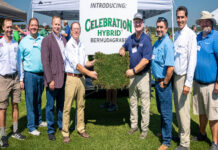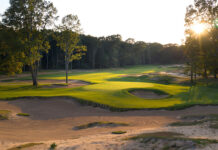By J. Wesley Allen
When development companies design golf courses and landscaped communities with lakes and stormwater ponds, they envision them as beautiful aquatic resources to attract visitors, connect with nature, and enhance the surrounding property. Without proper management, however, these waterbodies can quickly become eye-sores that produce harmful algae and bad odors, lead to damaged and eroded shorelines, and result in displeased members.
Most aquatic management professionals will tell you that when a property manager or golf course superintendent calls about an issue at their waterbody, it’s often past the point of a quick fix. This is regularly the case when we arrive onsite to look at an erosion issue on a lake or pond embankment. Rather than finding a few problematic patches of rock or soil, we discover steep, unstable banks, deep washouts and extensive bottom muck caused by years of sedimentation.

Erosion is a natural process caused by wind, rainfall, poor design, cultural impacts like mowing and recreation, or simply an aging aquatic ecosystem. These erosion issues are all exacerbated by human disturbance. Unfortunately, erosion can also negatively affect your lake, stormwater pond, canal or coastline by causing loss of habitat and property value, nutrient loading, reduced storage volume and waterbody depth, and excess runoff. When topsoil is displaced, stormwater pipes and structures can be exposed and damaged. Overtime, erosion can lead to the formation of trenches and gullies that pose a serious danger to the public.
Erosion Control Solutions
There are many ways to correct erosion with rip-rap, bulkheads, and other hard armoring systems; in certain situations, they may be the preferred option. In my experience, however, reestablishing the embankment utilizing vegetation, whether turf grass for recreation or native vegetation for habitat, has always been an excellent way to halt erosion and enhance community waterbodies. There are several best management practices that can help stop erosion and establish vegetation, but a lot of them have a shorter life-span or planting restrictions. Fortunately, there is a new solution available for both the immediate and long-term stabilization of shorelines and hillsides.
Bioengineered living shorelines are the latest technology in erosion control. These patented woven systems offer an innovative, environmentally-friendly solution to immediately stop shoreline and embankment erosion and create a natural foundation for vegetation. The most effective systems available are designed using a combination of ecofriendly, biodegradable burlap sock-like fabric and heavy-duty knitted mesh. The socks can be filled with local pond muck and sediment, which is why many property managers choose to pair this solution with proactive hydro-raking projects. After the woven mesh systems are filled, they are then secured to the embankment and can be immediately sodded, planted with native beneficial buffer plants, or seeded through the mesh and fabric layers.

As an Environmental Scientist, I’ve utilized several different shoreline restoration techniques over the years, but this innovative system is certainly creating some excitement! It provides immediate stabilization while effectively filtering and buffering run-off water, removing harmful contaminants and benefiting waterways and water quality, all the while providing a seamless planting platform and long-lasting erosion control. Restored banks and hillsides can be walked on within just a few days, making bioengineered shorelines a fast, aesthetically-pleasing and long-lasting solution for most properties.
Depending on the waterbody and specific erosion issues, goals and budget, a lake management professional may recommend other natural restoration tools. Lakes and ponds that experience heavy water movement may be suitable candidates for erosion control using logs comprised of coconut fibers. Installed in areas with direct water flow, these biodegradable logs can help redirect water movement while reducing erosion along delicate banks. Coconut “coir” logs are biodegradable, compact, and excellent solutions for properties in need of a truly custom erosion control approach.
Whether you decide to move forward with a complete shoreline restoration or are several years away, it’s imperative to properly budget and integrate proactive management strategies that protect banks and hillsides, while preserving the water quality of the aquatic resource. Cultivating a beneficial vegetative buffer with flowering native vegetation will help stabilize soil during rainstorms. Deep-rooted flowering plants can also help pull excess nutrients from stormwater runoff, preventing the growth of nuisance weeds and algae in the water resource. Undesirable nutrients can be further combated with the professional application of naturally-occurring nutrient remediation products, which permanently “lock up” and prevent nutrients from fueling aquatic weeds or algae.
Just like turfgrass management, lake and stormwater pond management is an ongoing commitment that requires different approaches throughout the year. While no two waterbodies are the same, each and every aquatic ecosystem is susceptible to shoreline erosion and can benefit from custom management plans that integrate buffer management and nutrient remediation, as well as other sustainable tools like hydro-raking, aeration, biological augmentation, and regular water quality testing. Whether a waterbody is in its prime or has seen better days, contact a lake management professional to help restore and prolong water resources—starting with the shoreline.
J. Wesley Allen is an Environmental Scientist and Regional Manager at SOLitude Lake Management, an industry-leading environmental firm. He has nearly two decades of experience leading high-profile shoreline stabilization and wetland restoration projects.
This article is the second in a series featuring new break-through technologies that will revolutionize the management of lakes, stormwater ponds, wetlands and fisheries in 2019.











![[VIDEO] Dickies®: Discover Workwear That’s Anything But Uniform](https://turfmagazine.com/wp-content/uploads/2023/06/1647663814-4b1a2a7742790a9b1e97a3b963477850192e1d6a9dfba9b07214a77bae25d6e3-d-218x150.jpg)






























![[VIDEO] Dickies®: Discover Workwear That’s Anything But Uniform](https://turfmagazine.com/wp-content/uploads/2023/06/1647663814-4b1a2a7742790a9b1e97a3b963477850192e1d6a9dfba9b07214a77bae25d6e3-d-324x160.jpg)